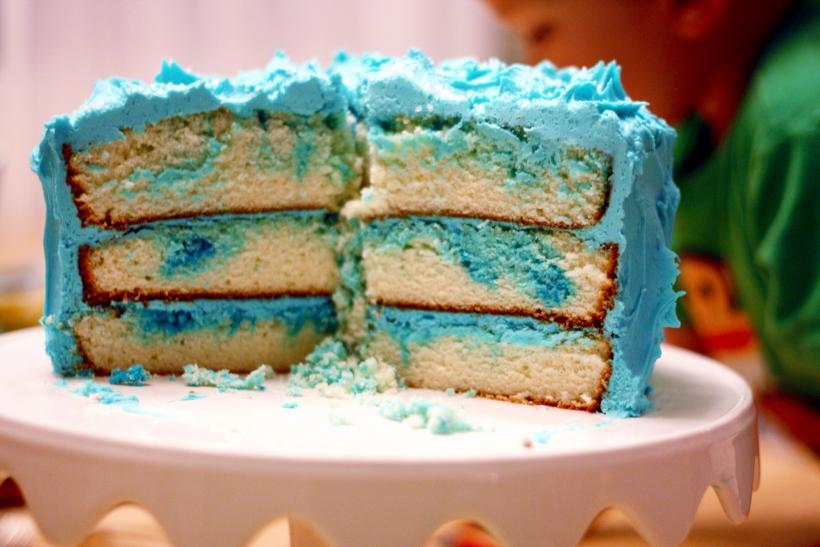
CN: diets, eating disorders, general screwed-upedness
Cake is my thing.
I am pretty good at some things — roasted chicken, fresh egg noodles, growing dahlias, knitting — but I am great at cake. Delicate layers, divided by a quarter-inch smear of homemade buttercream — my cake is the reason birthdays matter.
Buttercream frosting, if you’ve never had the privilege of tasting its homemade incarnation, is unlike any confection. Butter and powdered sugar whipped into submission, fluffy as a cloud, with a splash of Madagascar vanilla and a pinch of Himalayan salt, combine to create something like magic — if magic was made of butter and sugar and vanilla and salt (which it may actually be).
If you don’t like buttercream frosting, there is probably something broken in the Frosting Center of your brain. You should have an MRI.
My oldest daughter turned 21 this week. Two weeks before her birthday, I began to imagine the cake I’d bake: white (she is a White Cake kind of gal), maybe rainbow or pink ombre, crumb coated, then artfully frosted (but just imperfectly enough to be artisanal), perched atop my jade green glass cake pedestal and placed in front of her at the center seat of honor on our 7-foot-long birch dining table, ablaze with the flame of 21 pink candles.
I spent a lot of time thinking about the cake. An inordinate amount of time.
I planned the cake. I bought the cake flour, unbleached cane sugar, organic unsalted grass-fed butter, free range eggs, and powdered sugar (C&H? I’m not trying to buy organic powdered sugar). I picked a perfect tiny bunting garland to grace the top. I readied the frosting bags for any piping that might be necessary.
I dreamt of the cake.
And, as I dreamt and planned, I calculated the caloric sum of the ingredients, dividing by 12 (number of pieces) and factoring in an extra 50 calories per slice (acccounting for any frosting irregularities). As the day grew closer, I began to speculate what she’d want for dinner (most likely enchiladas, refried beans, rice). I began the mental gymnastics of the meal combined with the cake. How many calories would be in an enchilada? Could I make them less fattening? Do the tortillas really need to be fried? Could I eat just half of one and go unnoticed? How much oil do you really need to make refried beans? Mexican rice?
I didn’t want this to happen. I tried to will it not to happen, the descent into the rabbit hole of food preoccupation. But this is what recovery from an eating disorder looks like for me. It’s not a straight line; it’s a graph with wildly jagged ups and downs and a few rare and welcome plateaus.
The more problematic food is — more guilt-laden, more “bad”, more aligned with my own morality — the more time I spend thinking about it.
I finally asked her what she’d like for dessert, though I knew it would be the cake I’d imagined. But, as it turned out, she didn’t even want the thing I’d spent almost two weeks wet-dreaming about. Instead, she requested a simple strawberry pizza (a sugar cookie “pizza” with cream cheese buttercream frosting and strawberries on top).
I felt relieved.
I wouldn’t have to worry about the cake.
The cookie/frosting/berry caloric value would be so much easier to calculate. There are no irregularities in the processed glops of Pillsbury sugar cookie dough.
For those of us who have used a calorie or “point” counting method over the years to manipulate our intake (looking at you, Weight Watchers), this preoccupation with food is how we’ve made our days manageable. Wake and plan breakfast, lunch, and dinner, factor in two snacks, and — if you have points “left” — add in a blessed dessert. A square of chocolate, a glass of Cabernet Sauvignon or, on cake days, dive into your reserve points. “Save” points for things you want to eat but “can’t.” It’s best if you can do all of this a few meals in advance.
Or, if you’re an exercise bulimic like me, just add an additional X minutes of cardio to account for X cake/bread/cookie/whatever simple carbohydrate you’ve called forbidden but want so desperately that you’re willing to work it off pouring sweat at the gym.
Biking is good. Running is better.
The more problematic food is — more guilt-laden, more “bad”, more aligned with my own morality — the more time I spend thinking about it.
I mastered the food math equation many years ago. Even before the “Point System” was a thing, I was counting calories. 1200 or less. Always 1200 or less. My grandmother threw this number around at every family gathering like it had been etched by Moses as the 11th Commandment.
“11. Thou shalt only eat less than 1200 calories if thou dost seek to loseth weight.”
Even in recovery, the numbers won’t be forgotten. I can still easily combine any number of regular meals to equal my “point” allotment for the day, and adjust accordingly. High point-value dinner plan? Eat a low point lunch. Try to make space for dairy, because bones needs calcium, but accept that I won’t make space for dairy because milk has too many calories and isn’t “food.”
The further in advance I can plan, the more safety there is in the plan. Any deviation from the plan is cause for panic.
I cannot stop thinking about the food. Every bite of food.
This rigid attempt at control masquerades as safe, but at the end of the long, nutrient-deprived day, it only leaves me feeling out of control.
I thought I had recovered all the way, forever. Accepting my body meant I didn’t need to think about the impact every food I put in my mouth would have on my weight. But that’s not recovery; it’s diversion. It’s distraction.
Deciding that I needed — wanted, even — to put myself, my emotional, mental, physical, health first, didn’t mean not loving my body. But it did mean that my body would probably need to change to be more agile, more functional.
The default setting for change in me is weight loss.
I forgot that I learned that weight loss isn’t an answer. I forgot that I don’t love 220 pound me any more or less than 140 pound me. I forgot, because for 38 years my life was my body — its shape, its size, its desirability. My joy hinged on my physique.
I forgot and then I started calculating. I wish I could say that realizing that I was counting made me stop. But it didn’t. It felt comfortable, familiar, safe. It felt like an old friend, comfort in numbers, in objective information.
It’s both easier and infinitely more difficult to live in a place where food is the focus, often the only focus. I know that the ease is a trick that my disordered mind plays on my rational one. But that doesn’t always mean that my rational mind will win.
Sometimes the equations make my rational mind forget that obsessing over food is neither rational nor practical. And sometimes my rational mind remembers that cake or strawberry pizza is just food, and my energy can focus on the occasion instead of what I’m cooking.
If I want to change this default setting, I need to change how I see food. But the truth is I’m a mess of a human. I'm a complicated person seeking homeostasis. I wash my whites in Tide and Clorox because, even though I know it's bad for the environment, it's the only way I know to get towels white. I delete the desperate voicemails from my intoxicated mother, because it's the only way I know to deal with the sadness that the sound of her slurred voice brings. I eat sugar. I don't always buy organic. Some days I want to pull the covers over my head and pretend that I'm not a mother, that I don't exist.
I am a work in progress in the most real way. Some days I eat and it’s ok, and other days every tortured bite of food is another chance to punish myself with judgment and unrealistic expectation. Some days I get it and some days I don’t. Some days I cry with shame and other days I sing with pride. A lot of days, I do both.
But I’m fighting the good fight. I’m battling the demon every day. I will win, but it probably won’t be today.
See you next week.
Want to follow my journey? Join in? Cheer me on? Cry with me?
Follow me on Instagram and Twitter and Beyond Before & After here.
Join our Facebook group.
And drink your water.







